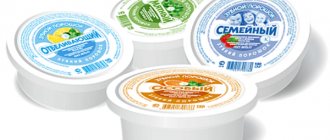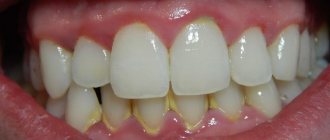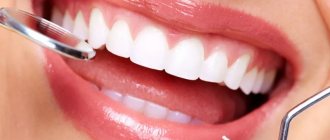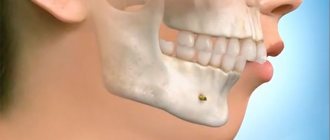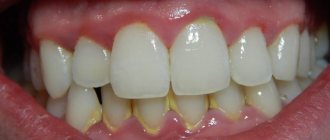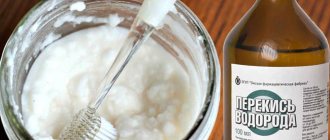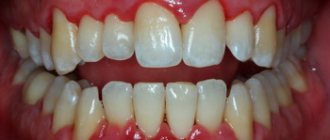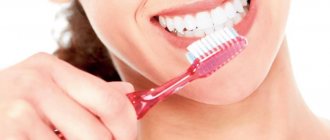- Causes of gum sensitivity Vigorously brushing teeth
- Changes in hormone levels
- Irritation from dental plaque
- Gingivitis
- Toothpastes
When inflammatory processes occur, the gums become red, itchy, and swollen.
Many people believe that these symptoms will go away over time and think that everything is fine. But if you start the problem of gum sensitivity, you can face more serious consequences. We tell you how to deal with sensitive gums at home, when to go to the dentist and what to choose for daily care.
Causes of gum sensitivity
The most common reasons include signs of disease and characteristics of the body or brushing teeth. Let's highlight the three most popular reasons.
Vigorous teeth brushing
Many people believe that in order to get a good cleaning, you need to press harder on the brush. And it’s even better if this brush has stiff bristles and the abrasiveness index of the paste is maximum. But if you are prone to sensitivity, this approach is especially harmful.
For thorough cleaning, soft bristles and low-abrasive paste are sufficient. And the cleaning technique does not have to be intensive. We wrote more about the techniques in the article “How to properly brush your teeth with a manual brush.”
Changes in hormone levels
Increased sensitivity of the gums is often observed in diseases of the endocrine and nervous systems, as well as in women during pregnancy. Changes in hormone levels lead to a deterioration in the blood supply to the mucous membrane. In addition, the number of bacteria in the oral cavity increases, and the enamel does not receive enough minerals.
Irritation from dental plaque
Irritation of dentin tissue is natural during the formation of dental plaque - a formation that can create an acidic environment in the oral cavity. Plaque is a mixture of bacteria, food debris, saliva and mucus with calcium and phosphate salts.
Poor hygiene leads to plaque accumulation, which pushes the gum away from the tooth. This causes redness and irritation of the gums. And subsequently gingivitis and even periodontitis.
Tartar: causes of appearance
Plaque forms on the surface of teeth in absolutely all people and is a soft biofilm consisting of food molecules and microorganisms. Soft plaque can be easily removed with a brush, floss and rinse. But in the absence of proper hygiene, it begins to thicken, darken, and after a few weeks mineralizes to the stage of stone.
In addition to untimely hygiene, the reasons for the formation of hard dental plaque can be:
- smoking
- excessive consumption of sugar and carbohydrates
- digestive diseases
- malocclusion
- use of poor quality hygiene products
- hereditary predisposition
What kind of improvised means did people use to clean teeth from tartar before the advent of the modern toothbrush? They used coal, iron, salt, tree bark, coconut oil, chili pepper, cloth and other available means.
Types of inflammatory gum diseases
We looked at the reasons that are not related to diseases. Now let's talk about what types of inflammations you should go to the doctor for. These include the three most common diseases: gingivitis, periodontitis and periodontal disease. Let's look at each of them in more detail.
Gingivitis
Gingivitis is an inflammation of the dentin tissue around a specific tooth. It occurs in both chronic and acute forms. The inflammatory process manifests itself only on the gums, without affecting the tooth tissue. Therefore, it is quite simple to cope with gingivitis before it progresses to the stage of periodontitis.
Periodontitis
Periodontitis is the inflammation of the tooth tissues that support it. This tissue is located between the root of the tooth and the jaw bone. The disease gradually moves the gum away from the tooth, forming a gum pocket. In other words, the gums expose the teeth, and they become sensitive. Food gets clogged into the gum pockets, pus appears in the acute phase, and the teeth gradually become loose and shift.
Inflammatory diseases are easy to distinguish by visual examination: with gingivitis - only redness and swelling, with periodontitis - also receding gums
What symptoms indicate inflammatory processes?
We have looked at the main reasons why gums become inflamed and bleed. But how to deal with the symptoms? What exactly indicates the disease until the gums begin to bleed and become swollen?
In addition to insufficient oral hygiene, inflammation can be caused by untimely treatment of pulpitis, the formation of tartar along the gum line, as well as fillings and crowns with an overhanging edge.
Symptoms include:
- pain when pressed or touched;
- bad breath;
- itching and redness around the tooth;
- discomfort when biting food;
- loosening of teeth.
Treatment and care for sensitive gums
Inflammatory gum diseases in adults and children do not arise out of nowhere. Sometimes it can take from 1.5 to 15 years for serious consequences to occur. But the first symptoms of inflammation, which we have already described, signal that it is worth at least choosing the necessary care and taking preventive measures.
In this section we will talk about products for daily care for bleeding and inflammation of the gums.
Toothpastes
Regardless of the cause of the bleeding, the first thing to look at is your toothpaste. During exacerbations, it needs to be changed to one that heals the mucous membrane and relieves inflammation.
To relieve gum sensitivity, choose pastes containing chlorhexidine, plant extracts (oak bark, sage, chamomile), allantoin, and essential oils (menthol, thymol). To pair with the paste, choose a brush with soft bristles. And don't forget to change it every 3 months. Complete your care with a rinse for sensitive gums.
Often, for gum inflammation, dentists recommend three types of pastes.
- With chlorhexidine - relieve inflammation and swelling, help restore soft tissue.
- With antioxidants - reduce pain, improve blood circulation in the gums.
- With herbs - protect soft tissues from irritation, help in the healing of ulcers, erosions and open wounds.
Apadent Perio toothpaste (90 gr)
Toothpaste Biorepair Gum Protection Gum Protection 75 ml
Dentissimo PRO-care toothpaste Protecting teeth and gums
Dentaid Perio-Aid tooth gel paste with chlorhexidine 0.12%
Rinse aids
To rinse sensitive gums, you should choose anti-inflammatory balms and rinses. They contain substances necessary to relieve inflammation and prevent the proliferation of pathogenic bacteria:
- amino acids;
- xylitol;
- chlorhexidine;
- hydroxyapatite and other components.
Dentaid Perio-aid Active control with chlorhexidine 0.05%
Waterdent mouthwash Chlorhexidine
Anti-inflammatory balm Vivax
Biorepair Mouthwash Gum Protection 500 ml
These balms can also be used to rinse sensitive gums after tooth extraction.
Local treatment: ointments, gels, collagen plates
Local treatment agents have a pronounced hemostatic, anti-inflammatory and healing effect. By applying the gel or plate to the site of inflammation, you will get a positive result the very next day. In the composition of the products you will find everything you need for healing and relieving inflammation:
- chlorhexidine;
- herbal extracts;
- amino acid complexes;
- biooxidants;
- collagens.
Farmadont II collagen plates for painful and sensitive gums...
Elugel gum gel
Tooth gel Pierre Fabre Parodium
Vivax anti-inflammatory tooth gel
Briefly about professional help
We've sorted out the home care products. Now we’ll tell you how gum sensitivity is treated and cared for in the dentist’s office. The choice of care depends on the degree of neglect and symptoms. In some cases, hygienic cleaning is necessary, and in case of serious consequences, physical therapy and a visit to a dental surgeon cannot be avoided.
- Ultrasonic hygienic cleaning allows you to remove plaque, microbial film and hard deposits without harming inflamed gums. This method has contraindications: asthma, heart failure, diabetes, postoperative period.
- Physiotherapy is an additional method for anti-inflammatory local therapy, which is most effective at the stages of gingivitis and periodontitis. Physiotherapy includes darsonvalization (microcurrent), massage and vacuum therapy. These types of treatments are aimed at strengthening dentin tissue.
- Surgical intervention is a last resort in the treatment of inflammatory processes of the gums. They resort to it when a person develops dental pockets and the tooth becomes very loose.
Natural teeth cleaning: dangerous or beneficial?
Natural teeth cleaning involves using only natural ingredients in oral hygiene products.
Below we will look at what folk recipes for brushing teeth exist and the degree of their safety:
Dentifrice
The most famous alternative to toothpaste is tooth powder. It was used more than five thousand years ago and served as the main means of hygiene until the advent of toothpaste at the end of the 19th century.
The composition of the tooth powder included a variety of components - crushed bones and antlers, pumice, eggshells, roots and leaves of plants, crushed minerals.
Today, for self-production of tooth powder, they use:
- Finely ground white or blue clay;
- A mixture of alum and ginger;
- Calamus root, sage, mint, nettle leaves, rose hip powder;
- Baking soda, sea salt.
The main advantage of such a powder is usually considered to be the naturalness of its components and their medicinal properties, and “Internet experts” prefer not to mention the other points.
The use of natural tooth powder cannot actually be called safe.
Most of its ingredients are coarse abrasives in structure, which, with prolonged use, can seriously damage tooth enamel.
This, in turn, can lead to the development of caries.
Homemade toothpaste
Today on the Internet you can find many recipes for natural toothpaste that you can prepare at home. The main components used in its preparation:
- Baking soda;
- Hydrogen peroxide;
- Glycerol;
- Essential oils.
At first glance, this paste seems healthy and safe, but, unfortunately, this is not the case. The presence of soda and hydrogen peroxide in the composition does not allow using this paste on a regular basis - soda and peroxide can not only whiten teeth, but destroy tooth enamel.
Home teeth whitening
Sometimes brushing your teeth at home means whitening them. Recipes from the Internet for teeth whitening most often recommend using baking soda, activated carbon, peroxide, citric or fruit acid.
When you decide to try one of these remedies, you should not forget that tooth enamel is sensitive to mechanical and chemical influences - particles of soda and salt can leave deep scratches on the enamel, and hydrogen peroxide and acids contribute to the thinning of the enamel.
Intensive home cleaning of tartar
Cleaning tartar at home is no less dubious than home whitening. Traditional medicine suggests brushing your teeth with salt or crushed walnut shells, lemon juice, and hydrogen peroxide.
None of these remedies are safe, because... can damage tooth enamel and gums. Tartar must be removed in a dental office - you can find out more at the link.
Before using “proven” tips on how to clean your teeth at home, be sure to consult with your dentist. This will help avoid negative consequences from questionable recipes.
Prevention of gum inflammation
Unpleasant symptoms of inflammatory processes can be avoided. With proper prevention and in the absence of diseases, it is enough to follow basic measures.
- Brush your teeth thoroughly every day with a manual or electric brush for sensitive gums, use dental floss and an irrigator.
- Create a balanced diet - do not abuse sweets, flour and sour foods, increase the amount of vegetables and fruits.
- To refuse from bad habits.
- Using rinses and balms will reduce the number of pathogenic bacteria in the mouth.
- Visit the dentist regularly, at least once every 6 months.
Advantages
- Efficiency. Waterpik interdental irrigators clean plaque much better than floss (dental floss).
- Fast process. Standard cleaning takes no more than 30 seconds.
- Easy to use. The guide tip ensures the correct angle of water flow.
- Ergonomics. The handle of the device fits comfortably in your hand. There is a pause button on it.
- Developing healthy habits. This is a simple and affordable way to improve the quality of interdental cleaning.
- Prevention. The Waterpik irrigator helps prevent caries and improves the condition of the gums.
